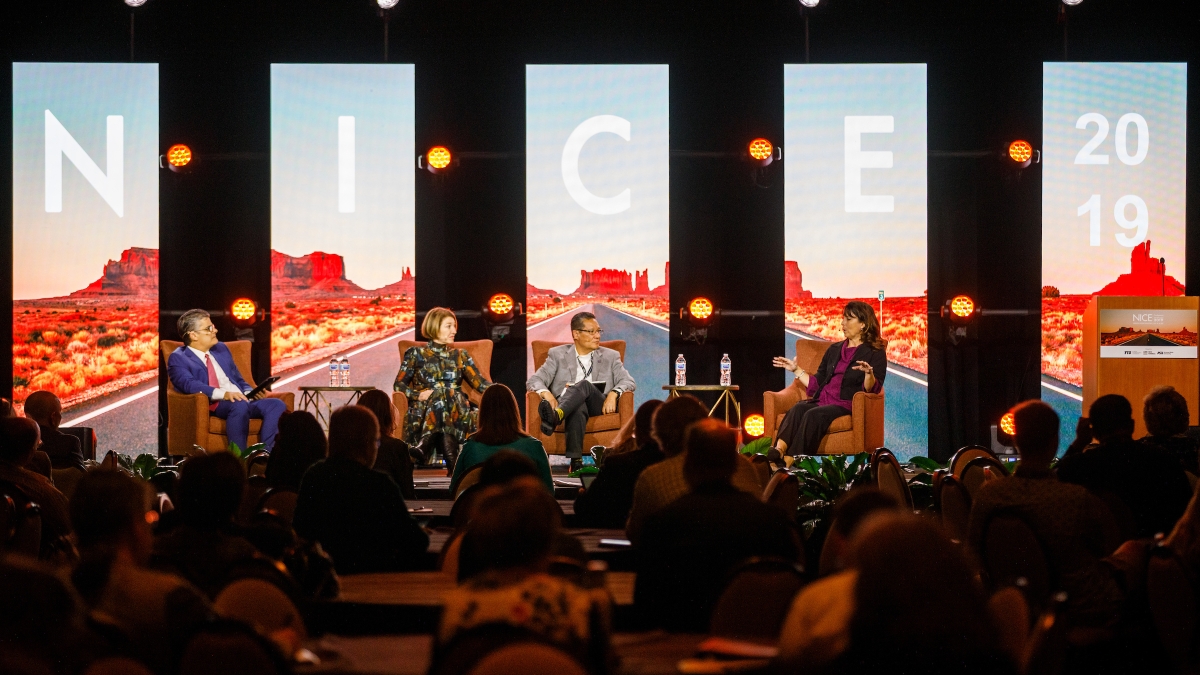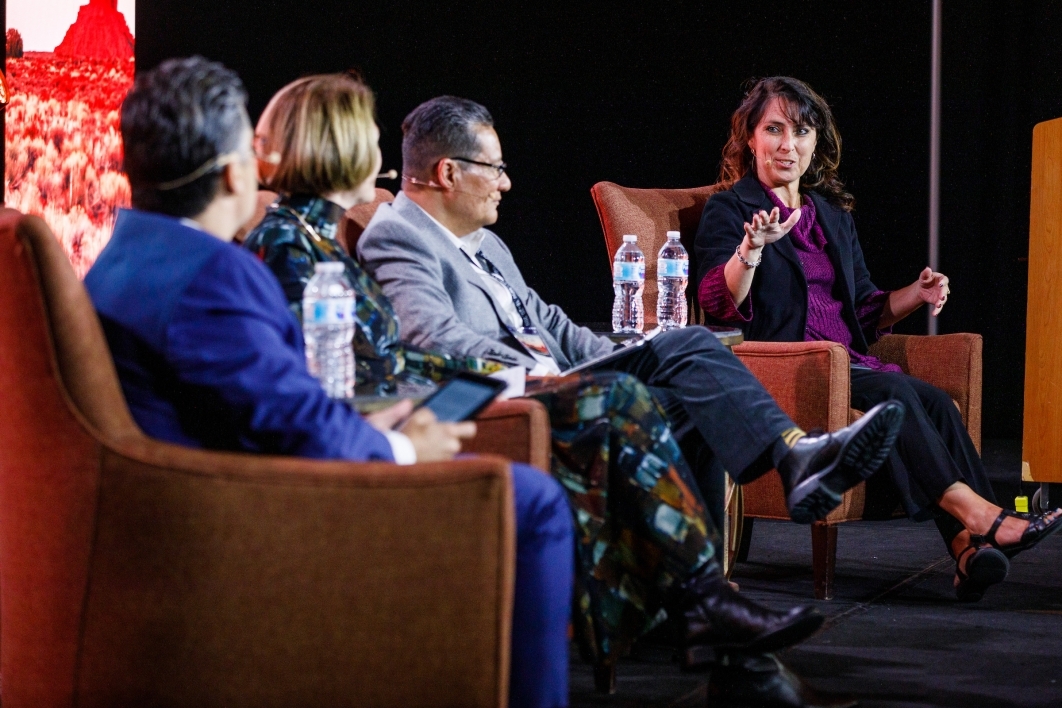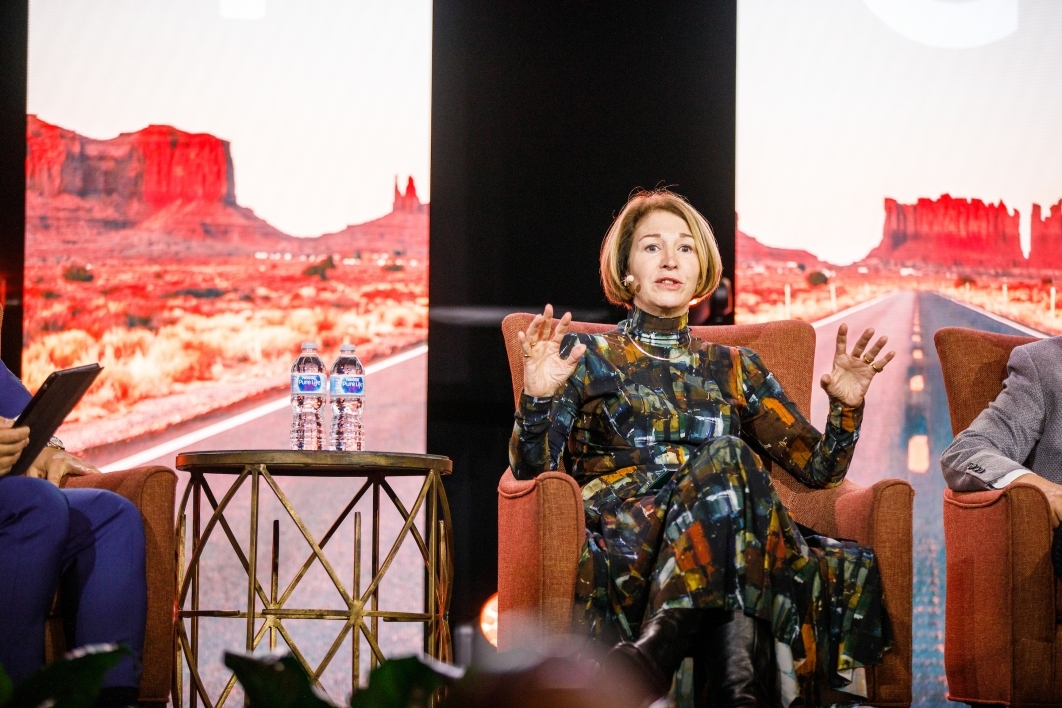Russian grid hacking. Cyberinfiltration of U.S. universities. Rampant data exposures. Spy tool-breaching. Shadow Brokers. And more.
These challenges — including cyberthreats, disinformation and privacy in the age of big data — are just a few of the big global cybersecurity challenges being tackled by faculty, researchers, scientists and students at Arizona State University’s Global Security Initiative. Last week, two ASU-hosted events put a critical spotlight on cybersecurity and the preparation and training of the industry’s future workforce.
The marquee event was the 10th annual meeting of the National Initiative for Cybersecurity Education, a conference in downtown Phoenix that brought together thought leaders from industry, government, academia and nonprofit organizations to address the community's cybersecurity education, training and workforce needs. Hosted by ASU, Florida International University and New America, the NICE Conference and Expo — “Reimagining the Future of the Cybersecurity Workforce: Adapting to a Changing Landscape” — provided an opportunity to share best practices from around the world and across sectors in order to build the workforce needed to confront cybersecurity risks now and in the future.
“Cybersecurity will play an increasingly important role in the future of work, particularly as automation permeates industries of all types,” said Sethuraman Panchanathan, executive vice president of ASU Knowledge Enterprise and the university’s chief research and innovation officer. “Interagency cooperation and collaboration with leading research institutions allows us to create ecosystems of education around this key issue.”
A keystone event at the NICE gathering was the “Future of Cybersecurity Education” panel discussion facilitated by FIU Chief Information Officer Robert Grillo, featuring Tina Thorstenson, ASU chief information security officer and deputy CIO for IT Governance, Policy and Information Security; Anne-Marie Slaughter, New America CEO; and Lee Lambert, Pima (Arizona) Community College chancellor.
“It is clear that the future of delivering better cybersecurity starts by improving the pipeline and qualifications of people who will become the front line of defense to address the myriad security threats that face us as a nation,” said Slaughter, who heads New America, a 20-year-old nonprofit think tank focused on the challenges caused by rapid technological and social change.
“By seeing firsthand the innovations put forward by Arizona State University and Florida International University in knowledge development, and seeing how it complements the work that New America is doing on cybersecurity and the cyber workforce, it really gives me hope that, though the cyber threats we face continue to multiply exponentially, we are training the next generation of cybersecurity experts who will challenge these threats,” she said.
Jamie Winterton, who moderated a cybersecurity careers panel during last weekend’s “Cyber Day 4 Girls” at the West campus and served as the academic co-chair of the NICE Conference, says ASU’s role in the two events is a reflection of the university’s standing in the industry and its advancement of a well-prepared cybersecurity workforce in the future.
“Ensuring the security of our internet-connected society – from protecting an individual’s personal information to ensuring the seamless operation of our electrical grid — is a tough challenge,” said Winterton, director of strategy for ASU’s Global Security Initiative, where she coordinates and participates in defense- and security-related research.
“The tough challenge is constantly evolving," she said. "ASU brings an innovative, mission-driven mindset to the problem, which is also reflected in how we approach cybersecurity education. ASU’s cybersecurity offerings can be found across the university — in computer science, IT, applied computing, business, law, politics and global studies and more. And we partner closely with community colleges, the local business community and government to address real-world threats.”
Slaughter, who was the first woman to serve as director of policy planning for the U.S. Department of State, says the NICE Conference was important to ensuring that the cybersecurity workforce remains a focus moving forward.
“We cannot adequately protect the nation from all of the cybersecurity threats that exist if we do not take care to ensure that we are mobilizing a workforce that reflects our entire population. ASU, FIU and other innovative universities are at the heart of making sure we're preparing appropriately for the future of cybersecurity threats.
“With cybersecurity, when time is of the essence to respond to these threats, it is important to fill critical positions quickly from a qualified and diverse workforce that can adapt to the cyberdangers of the moment,” Slaughter said.
To that end, ASU’s New College of Interdisciplinary Arts and Science partnered with IBM and GSI to host nearly 200 middle school girls from 14 schools around the Greater Phoenix area at its recent Cyber Day 4 Girls event. Cyber Day featured industry experts and panel discussions designed to give the students a greater understanding of cybersecurity issues such as the protection of personal information, the internet of things and the career opportunities that exist within the field.
Panchanathan says the university’s Global Security Initiative provides many of the answers and solutions to challenges in the field of security, including cybersecurity. As an initiative of the university’s Knowledge Enterprise, GSI has developed practical mission-relevant approaches and effective decision-oriented tools while working with defense, security and diplomacy communities. A prepared workforce for the future is one of those challenges.
“Exploring various aspects of security and identifying the specific skill sets and mindsets that will be crucial to this type of work in the future will help ensure we can proactively address challenges.”
Top photo: Speakers on the “Future of Cybersecurity Education” panel discussion converse during the 10th annual meeting of the National Initiative for Cybersecurity Education in downtown Phoenix on Nov. 19, 2019. Left to right, the panel consisted of Florida International Univeristy Chief Information Officer Robert Grillo; Pima (Arizona) Community College Chancellor Lee Lambert; New America CEO Anne-Marie Slaughter and ASU Chief Information Security Officer and Deputy CIO for IT Governance, Policy and Information Security Tina Thorstenson. Photo by Andy DeLisle
By Steve Des Georges
More Law, journalism and politics
Can elections results be counted quickly yet reliably?
Election results that are released as quickly as the public demands but are reliable enough to earn wide acceptance may not always be possible.At least that's what a bipartisan panel of elections…
Spring break trip to Hawaiʻi provides insight into Indigenous law
A group of Arizona State University law students spent a week in Hawaiʻi for spring break. And while they did take in some of the sites, sounds and tastes of the tropical destination, the trip…

LA journalists and officials gather to connect and salute fire coverage
Recognition of Los Angeles-area media coverage of the region’s January wildfires was the primary message as hundreds gathered at ASU California Center Broadway for an annual convening of journalists…




